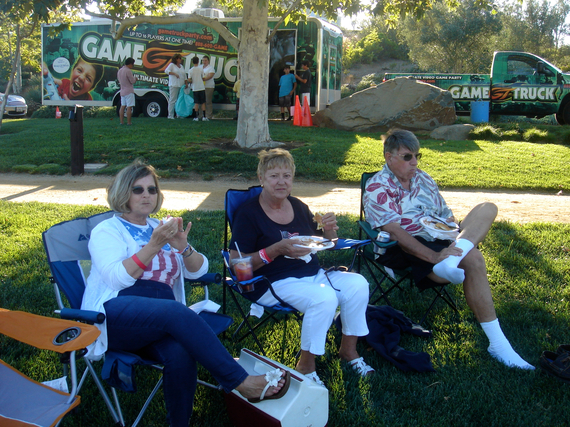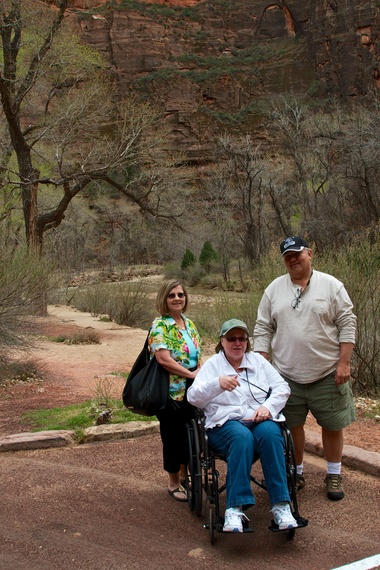In 2014, a young, vibrant woman named Brittany Maynard moved from the home in California she had known all her life so that she could die on her own terms in Oregon. Diagnosed with glioblastoma, arguably one of the most monstrous forms of cancer in this world, Maynard was willing to uproot her life, put her face out into the world, and share a most intimate decision with a universe of strangers in order to help people understand why someone might make the decision to hasten their death.
With little fanfare and no more than a small sidebar in the local newspaper, California has just become the fifth state to legalize assisted death for terminally ill patients. When I read it, on a plane on my way to deliver a talk on how we deal with death in our culture, I cried. I cried for Maynard, and for my mother (seen here on the left at last year's Fourth of July bash), and for me.
Like so many others, I was transfixed with Maynard's bravery in opening herself up to scrutiny and criticism. I put myself in her place and wondered what I would have done in the same situation. As a veterinarian who routinely helps people gently end the lives of pets suffering from terminal disease, the idea is not as challenging to me as it is to many. Especially with brain cancer -- something that can rob you of the essence of who you are, turn you into someone else, snaking its way without order or reason through your control panel until your body can no longer hang on.
It is, to me, one of the most petrifying propositions out there.
So when my own young and vibrant mother was diagnosed with the very same cancer not five months after Maynard's death, I fell to my knees and cried with grief, with anger, and above all with terror. For we, too, live in California, and my mother's delicate health by the time she was diagnosed did not allow us the luxury of moving anywhere. Three weeks before her diagnosis, she was hiking though Red Rock. Three weeks after, she was bedbound.
It happened that quickly.
I found myself preoccupied with fear for my mother, and worry about what I might do if her pain and suffering were unable to be controlled. Hospice and palliative care is excellent, but even that has its limits. People I thought were my friends sent me all sorts of horror stories they have heard about this cancer, expressing remorse at the news and the hope that my mother, ever so dignified, would not be one who would lose it all in the fugue of neoplasia.
I am really good at delivering an easy death. I have access to drugs no one else can get, and they are remarkable. We can give them to dogs and cats and rats and horses, but not to people. People have to ride it out on cocktails with middling degrees of efficacy.
Our own perceptions make it worse: more than half of palliative care professionals have been accused of "euthanasia or murder" by providing adequate palliation to dying people, because euthanasia for a pet is mercy but for a human is dastardly. We have a long way to go in how we think of these things.
Fearing the Loss of Control
Instead of concentrating on my time with my mother, I spent most of it worrying -- what would I do if the meds stopped working? How would I respond if she asked me to help her die? How could I refuse? How could I say yes? I had no reassurance that the necessary tools to control the situation were in my toolbox, and that took away from so many little moments I wish I could have back.
In the end, my mother's cancer took mercy on her. She died quickly, as she wished, and never once complained of pain. She forgot things, felt sleepy, and drifted off oh so gently into that good night. It was a blessing, strange as it sounds.
Had we been given access to life ending drugs, she would likely have filled the prescription.
Had she filled the prescription, secure in the knowledge that she had some control, she would not have taken them. She didn't need them. It doesn't change my mind one bit as to their necessity, doesn't make me any less inclined to cheer this new law and fight any who would seek its appeal.
Because it's not the inevitability of the outcome that matters in these situations, it's the little bits of control we are given in times where so much of it has been taken away.
And that would have changed so much.
Dr. Jessica Vogelsang is a hospice care veterinarian and author of the memoir All Dogs Go to Kevin. You can read more about her work at DrJessicaVogelsang.com.
She also posts about pet care and life with dogs, kids, and cats at her blog, pawcurious.com.

